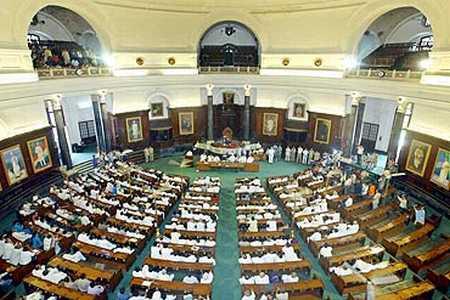
Think logically, speak convincingly, shed your inhibitions, and become a team person.
Loud thumping of tables, furious passing of notes, shouts of 'order in the house,' countered by affirmations of 'hear-hear,' followed by jeering -- this is not a scene from the last Lok Sabha session, but an event that takes place in many colleges and universities across the country.
Parliamentary debating is becoming increasingly popular in India. As opposed to the familiar format involving two people speaking for or against a statement or proposition for a few minutes, parliamentary debating is a group sport.
In the Asian format of parliamentary debating, which is most popular in India, two teams of three members each go against each other. Each speaker has about seven minutes to build the case, rebut their opponents, take questions and tie it all up to convince the judges. In other words, the 'government' and the 'opposition' debate a motion in the House, with the 'prime minister' and the 'leader of opposition' along with their deputies building their respective cases, and the 'whip' from either side closing the case.
Debaters have about 20 minutes to prepare, unlike debates in the US which involve months of preparation.
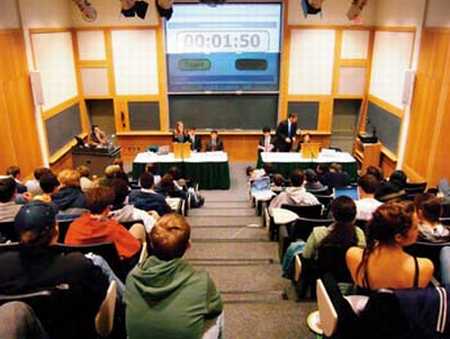
Indian experience
Parliamentary debating (PD) is relatively new in India. "St. Stephen's College was probably the first to start a parliamentary debating tournament when it converted its Mukherjee memorial debate into a PD in the 1990s," says Sidharth Chauhan, a teacher at National Law School of India University (NLSIU), Bangalore, and a parliamentary debater for nine years.
In 2002, NLSIU started its own PD tournament, which has grown to be one of the biggest contests of its kind in terms of registration of teams.
Today, some of India's prestigious colleges -- Narsee Monjee Institute of Management Studies, Shri Ram College of Commerce, BITS-Pilani, MS Ramaiah Institute of Technology, RV College of Engineering and several of the IITs, among them -- have very active debating societies. These colleges hold about 50 PD tournaments between them and, despite rivalries, often help each other improve the overall quality of debating.
Started by the four debating societies last year, Bangalore Circuit Debate, for instance, saw teams from Tumkur travel about 70 km to Bangalore every day to improve their debating skills. "Generosity of the seniors is crucial to the continuance of debating traditions. It is because successive batches have shared their full expertise that the standard is now improving," says Dhruva Desai, a debater from Ramjas College in Delhi.
While parliamentary debating is largely the domain of undergraduate and postgraduate students in India, NLSIU has started a project to prepare school pupils in Bangalore for PD. NLSIU is also taking its PD workshops to Delhi in October and hosting what has been billed as the first-ever PD tournament for school children in November this year, says Vipul Nanda of NLSIU.
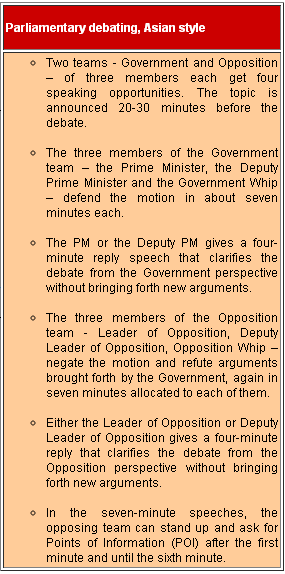
International links
Indian PD societies have been ambitious enough to establish links and compete internationally. NLSIU, MS Ramaiah Institute of Technology, and Christ University, for instance, jointly bid in 2009 for hosting the Asians British Parliamentary Debate Championship. RV College of Engineering and IIT Mumbai also bid for the same tournament the following year.
Both the bids were lost, "but we are improving our ability to compete internationally," says Vipul whose NLSIU-mate Nishita Vasan has been selected to be part of the main adjudication core of the United Asians Debating Championship in 2012.
At any of the larger tournaments in India, one may well bump into someone from Pakistan, Bangladesh, Sri Lanka, or someone who is in India on holiday, but studying abroad. Within Asia, Singapore, Malaysia, the Philippines, Bangladesh and Sri Lanka are other important centres for PD competitions. "It is nice to know that I have friends to meet up with in Colombo or Dhaka," says Sidharth of NLSIU.
About her Indian counterparts, Vishakha Wijenayake, an accomplished debater from Sri Lanka who has been to India six times in the last four years, says "They are fiercely competitive, but extremely chilled out as well."
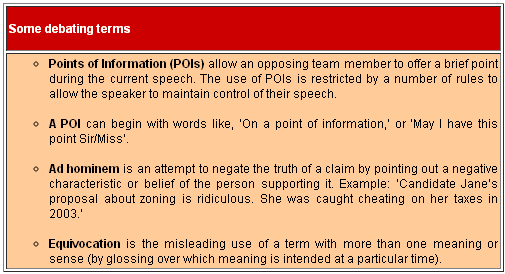
Orator or debater?
One of the liberating features of PD is that a debater does not have to be a fantastic orator. While poise, eloquence and rhetoric are handy debating tools, PD participants usually have barely enough time to spit out the mouthful of words that they always keep ready.
In conventional debating, speakers are usually expected to begin with a quote by a famous person and have appropriate body language and vocabulary; PD primarily requires logical speaking. One can have a stutter, but still be a good parliamentary debater. A speaker has to deal with a continuous stream of questions from the opponents and carry on.
"You have to stay on your toes to be able to respond to the changing dynamics. Debating is a lot about strategising rather than simply knowing things," says Nishita Vasan. Pranay Bhatia, a former debater from IIT Bombay, adds: "Twenty minutes of preparation time is not always enough to discuss an issue completely. So debaters need to be preparing by learning as much as they can at all times." Vipul says he spends weeks thinking about certain arguments.
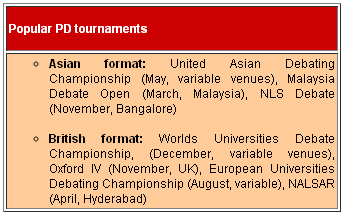
Personal development
Nishita says her PD tours across the country and abroad helped her as a team player and her ability to get along with people from other cultures.
Debating is also believed to have helped students write better papers and do better research. "One can't help becoming more objective and thinking about the other side of any issue," says Dhruva of Ramjas College.
Pranay of IIT Mumbai says if he had not debated as much as he did, he would probably have attended more classes and achieved better grades. "But I also would not have learnt as much in life or enjoyed college as much."
Doesn't that say it all?